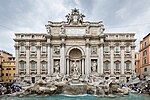תפקידה של הכנסייה הקתולית בתרבות המערבית
לכנסייה הקתולית היה חלק חשוב בעיצוב של תרבות המערב[1][2][3][4]. ההשפעה של הכנסייה הקתולית הייתה כה גדולה כי עד עידן הנאורות הייתה המקור היחיד של שירותים חברתיים בסיסיים, כמו חינוך ובריאות, הקמת אוניברסיטאות (כגון אוניברסיטת אוקספורד וקיימברידג', סורבון) ועוד[5].
בנוסף, ישנם היסטוריונים הטוענים כי הכנסייה השפיעה בצורה חיובית ומשמעותית על התפתחות המדע[5][6] לאורך ההיסטוריה היו כמרים (לרוב ישועים) שעסקו בשלל תחומי המדע, כולל אסטרונומיה, גנטיקה, מטאורולוגיה, סייסמולוגיה, פיזיקה[7][8].[9] חלק לא מבוטל מן הכמרים הללו הפכו להיות 'אבות' המחקר בתחומים אלו (כגון גרגור מנדל וז'ורז' למטר וגרגוריוס השלושה עשר ואתנסיוס קירכר, ניקולאוס קופרניקוס) ועוד. אולם לדעת היסטוריונים אחרים הכנסייה השפיעה בצורה שלילית על התפתחות המדע. כדוגמה מובאת פרשת משפטו של גליליאו הנחשבת לאחד העימותים המפורסמים בהיסטוריה בין דת ומדע. למרות שהפרשה מורכבת יותר. עד שלב מסוים גילתה הכנסייה הקתולית ברובה יחס חיובי וסובלני לעבודתו של גלילאו, ולגלילאו היו יחסים קרובים וחבריים עם בכירים בכנסייה[10]. בנוסף, כ -65.4% מזוכי פרס נובל שייכים לנצרות בצורותיה השונות בתחומים השונים (נכון לשנות 1901-2000).[11] ו60% מזוכי פרס נובל לפיזיקה שייכים לרקע נוצרי (נכון לשנות 1901-1990)[12].
הכנסייה הקתולית השפיעה על הרפואה, על שירותי הרווחה[13], על הכלכלה[14][15][16], התרבות, פילוסופיה; ספרות, שפות, בלשנות, מוזיקה, תיאטרון, ופוליטיקה[17], משפטים[18], חינוך[19], אנטומיה, אדריכלות, עודדה את מאמיניה לדאוג להיגיינה אישית מסוימת[20], ודאגה לשמירה על חיי המשפחה[21].
ההשפעה התרבותית של הכנסייה הקתולית על העולם המערבי רבה. פסטיבלים כמו חג הפסחא וחג המולד נחגגים כמו חגים אוניברסליים; הלוח הגרגוריאני שהונהג על ידי האפיפיור גרגוריוס ה-13, הוא הלוח שמשמש ברובן המכריע של מדינות העולם לקביעת מועדים "אזרחיים", ובספירת הנוצרים השיטה לפיה נספרות שנים יחסית לשנת לידתו המשוערת של ישו.
נצרות קתולית היא עדיין דתם של רוב התושבים במספר מדינות מערביות מרכזיות, בהן איטליה, צרפת, ספרד, פורטוגל ופולין וכן מדינות בדרום אמריקה כמו ארגנטינה, ברזיל, מקסיקו, וכן מהווה מיעוט משמעותי וגדול במדינות אחדות בהן ארצות הברית, קנדה, גרמניה ואוסטרליה.
לדעת היסטוריונים רבים הכנסייה הקתולית השפיעה בצורה שלילית בנושאים כמו אנטישמיות[22], הומופוביה[23][24], מיזוגיניה[25] ועבדות. הובילה את האלימות של מסעי הצלב והאינקוויזיציה. בנוסף, ישנם היסטוריונים הטוענים כי הכנסייה השפיעה בצורה שלילית בפוליטיקה במהלך התקופה הקולוניאלית[26] ובגלל הקישור והתמיכה בדיקטטורה ומשטרים טוטליטריים בדרום אמריקה כמו ארגנטינה[27] וצ'ילה ואיטליה, ספרד, פורטוגל, אוסטריה וקרואטיה[28].
-
פסל פייטה של מיכלאנג'לו בואונרוטי.
-
אוניברסיטת נוטרדאם, אוניברסיטה קתולית גדולה במדינת אינדיאנה שבארצות הברית.
-
מזרקת טרווי، שאת בנייתה יזם האפיפיור קלמנס השנים עשר
-
גרגור מנדל, כומר קתולי המכונה גם "אבי הגנטיקה".
ראו גם
עריכההערות שוליים
עריכה- ^ Cambridge University Historical Series, An Essay on Western Civilization in Its Economic Aspects, p.40:Hebraism, like Hellenism, has been an all-important factor in the development of Western Civilization; Judaism, as the precursor of Christianity, has indirectly had had much to do with shaping the ideals and morality of western nations since the christian era.
- ^ Caltron J.H Hayas, Christianity and Western Civilization (1953),Stanford University Press, p.2:That certain distinctive features of our Western civilization — the civilization of western Europe and of America— have been shaped chiefly by Judaeo - Graeco - Christianity, Catholic and Protestant.
- ^ Horst Hutter, University of New York, Shaping the Future: Nietzsche's New Regime of the Soul And Its Ascetic Practices (2004), p.111:three mighty founders of Western culture, namely Socrates, Jesus, and Plato.
- ^ Fred Reinhard Dallmayr, Dialogue Among Civilizations: Some Exemplary Voices (2004), p.22: Western civilization is also sometimes described as "Christian" or "Judaeo- Christian" civilization.
- ^ 1 2 Koch, Carl (1994). The Catholic Church: Journey, Wisdom, and Mission. Early Middle Ages: St. Mary's Press. ISBN 978-0-88489-298-4.
- ^ Dawson, Christopher; Glenn Olsen (1961). Crisis in Western Education (reprint ed.). ISBN 978-0-8132-1683-6.
- ^ Wright, Jonathan (2004). The Jesuits. p. 189.
- ^ Susan Elizabeth Hough, Richter's Scale: Measure of an Earthquake, Measure of a Man, Princeton University Press, 2007, ISBN 0691128073, p. 68.
- ^ Encyclopædia Britannica Jesuit
- ^ Walsh, James Joseph, The Popes and Science; the History of the Papal Relations to Science During the Middle Ages and Down to Our Own Time, Fordam University Press, New York 1908, p. 19.
- ^ Baruch A. Shalev, 100 Years of Nobel Prizes (2003),Atlantic Publishers & Distributors, p.57: between 1901 and 2000 reveals that 654 Laureates belong to 28 different religion Most (65.4%) have identified Christianity in its various forms as their religious preference.
- ^ Nobel prize winners in physics from 1901 to 1990
- ^ Encyclopædia Britannica Church and social welfare
- ^ Weber, Max "The Protestant Ethic and The Spirit of Capitalism" (Penguin Books, 2002) translated by Peter Baehr and Gordon C. Wells
- ^ Encyclopædia Britannica Property, poverty, and the poor
- ^ Weber, Max (1905). The Protestant Ethic and the Spirit of Capitalism.
- ^ BiBle and Law
- ^ chruch and law
- ^ Encyclopædia Britannica Forms of Christian education
- ^ Cleanliness WHY IS IT IMPORTANT?
- ^ Encyclopædia Britannica The tendency to spiritualize and individualize marriage
- ^ Walter Laqueur (2006)" The Changing Face of Antisemitism: From Ancient Times to the Present Day, Oxford University Press, ISBN 0-19-530429-2. p.62
- ^ CCC 2357
- ^ trans. in Derrick Sherwin Bailey, Homosexuality and the Western Christian Tradition, (London: Longmans, Green, 1955), 73-74
- ^ Feminist philosophy of religion
- ^ Melvin E. Page, Penny M. Sonnenburg (2003). Colonialism: an international, social, cultural, and political encyclopedia, Volume 1. ABC-CLIO. p. 496.
Of all religions, Christianity has been most associated with colonialism because several of its forms (Catholicism and Protestantism) were the religions of the European powers engaged in colonial enterprise on a global scale.
- ^ Los Angeles Times: Argentine Cardinal Named in Kidnap Lawsuit, 17 April 2005
- ^ The Vatican and Fascism in the 20th century






